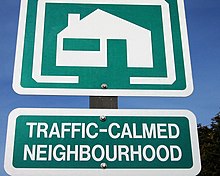

Traffic calming uses physical design and other measures to improve safety for motorists, car drivers, pedestrians and cyclists. It has become a tool to combat speeding and other unsafe behaviours of drivers.[1] It aims to encourage safer, more responsible driving and potentially reduce traffic flow. Urban planners and traffic engineers have many strategies for traffic calming, including narrowed roads and speed humps. Such measures are common in Australia and Europe (especially Northern Europe), but less so in North America. Traffic calming is a calque (literal translation) of the German word Verkehrsberuhigung – the term's first published use in English was in 1985 by Carmen Hass-Klau.[2]
- ^ Caves, R. W. (2004). Encyclopedia of the City. Routledge. p. 674. ISBN 978-0415862875.
- ^ Hass-Klau, Carmen (February 1985). "Trying to calm the motor car". Town and Country Planning: 51–53.